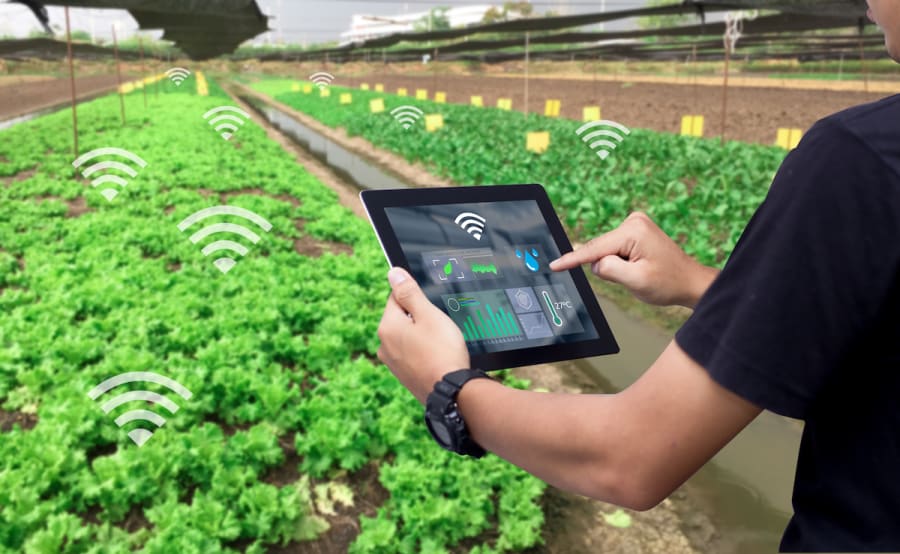Does small Israel have outsized solutions for global food shortages?
Israel is uniquely qualified to brave the coming challenges

According to the World Bank, we are in a global food crisis. Food shortages across the world are mushrooming like unwelcome weeds amid a nourishing crop of golden wheat.
In the United States, the Center for Security Policy (CSP) published a revealing report on November 3, 2022, titled “Food Security is National Security.” Presently the U.S., other countries, and concerned organizations are meeting to assess vulnerabilities and discuss solutions.
CSP lists varying food security challenges in the U.S. – from cyberattacks and suspicious fires at food-processing plants to power outages from snowstorms and hurricanes, supply chain slowdowns, and trucking interrupted by critically low diesel fuel reserves. The United States is the biggest producer of food worldwide, yet we do not have a strategic food reserve or a plan to deal with inevitable disruptions.
The World Bank also sounded an alarm about food shortages in its latest Food Security Update on Oct. 31. Delving into only a few primary reasons here, the World Bank’s update is sobering for the poorest of the poor who for decades have already experienced the tragic suffering that famine and inadequate clean water bring. However, for multilayered reasons, Western nations and others are now facing challenges with food supplies.
Among them: Inflation and oil shortages are driving up food prices. COVID-19 shutdowns slowed the transportation of goods around the globe. In its war against Ukraine, Russia has caused a worldwide crisis, since both nations are top wheat sources. (Russia is also a top fertilizer producer; a shortage affects farmers’ yields.) In response to ongoing food concerns, the World Bank Group has decided to set aside up to $30 billion for the next 15 months for agriculture, nutrition, water, and irrigation. Much of the monies have been earmarked for the most vulnerable populations.
Where else can we turn for answers to this urgent and growing problem?
In pre-state Israel – beginning with the first significant wave of immigration (aliyah) in 1881 – land reclamation, innovation, and determination marked the labor and spirit of Jewish Zionists. Today, the diminutive nation of Israel is an outsized world leader in abundant AgTech, Food Tech, and Water Tech research, development, and production. God’s promises to Israel and all nations in Genesis 12:3 are, once again, a blessing to the world in the face of food shortages. Israel’s innovations in an array of technologies improve planting and harvesting crops, and desalinating water.
Israel’s history proves that there is hope. Against all odds – the backbreaking work, the malaria outbreaks – the Zionists’ and Israelis’ determination fulfilled God’s promises in Isaiah 35:1-3, making His promise a reality. “The desert will rejoice, and flowers will bloom in the wastelands. The desert will sing and shout for joy. … Everyone will see the Lord’s splendor, see His greatness and power.” Indeed, as verse 3 exclaims, God “gave strength to hands that were tired and to knees that trembled with weakness.”
When deserts and desolation greeted the first Jewish immigration wave, the early Zionists were undaunted. Committing themselves to the soil, they were driven by a national longing for their ancient homeland. They were also moved by awareness of 2,000 years of prayers for those living during the Jewish diaspora. The Ottoman Empire was in control of what was then called Palestine until 1917 when the British defeated the Ottomans. Although the Muslim Ottomans ruled for 400 years, they did not cultivate the land.
Four more early aliyah waves were followed by the fifth wave in 1939 – a 58-year span. Mark Twain, who visited in 1867, could not have imagined what Israel would one day become. In "The Innocents Abroad," Twain described the pre-state Israel that he and other travelers toured: “The further we went the hotter the sun got, and the more rocky and bare, repulsive and dreary the landscape became. … There was hardly a tree or a shrub anywhere. Even the olive and the cactus, those fast friends of a worthless soil, had almost deserted the country.”
That is, until the first five waves of aliyah kept coming to plant and cultivate the land until World War II broke out. As an interesting historical note, Twain stayed in the Imperial Hotel right inside Jerusalem’s Jaffa Gate. The New Imperial Hotel still welcomes guests in its upgraded 19th-century building.
Israel has been helping other nations with agricultural tools for some time – as it helps itself.
For years, Africa and India have used water and crop technologies through Tel Aviv’s Nitsan Sustainable Development Lab to aid their populations. Nitsan focuses on small farmers, as noted by Director Ram Fishman: “Many farmers around the world look to Israel as a model of how to manage and flourish in conditions of water scarcity and a hotter, drier climate.”
A few more success stories of Israel developing new technologies to give Mother Nature a helping hand:
• Yatir Forest – planted by the Jewish National Fund to provide work for new immigrants in the 1950s – is now one of the world’s only fully functional forests in hot, semiarid climates.
• Fish in the desert, unthinkable? Aquatech Fisheries, founded in 2012, raises fish using water technologies that Israel has employed for decades in its water-empty landscape. Aquatech’s near-miraculous efforts result in thousands of tons of fish in the Negev Desert without any environmental damage.
• To meet the challenges caused by population growth, depleted soils and weather unpredictabilities, BetterSeeds is devoted to the production of seeds that adapt to many climates and also contain more nutrients.
• And with worldwide bee populations dwindling, Israelis are addressing this critical issue. They have created an artificial pollinator service and BeeHero “smart” hives to better protect the tiny winged heroes that play such an important role in continuing our food supply.
• Every three years, Israel hosts AgriTech Israel, an international exhibition and conference that draws thousands of delegates from dozens of countries – people at the forefront of technological innovations in agriculture.
Various regions in the United States use Israeli agricultural and water technologies, too. For example, via a public-private partnership between Israel and San Diego, California, the Carlsbad Desalination Plant provides clean, safe water from the ocean to more than 300,000 Californians. With the worst drought in 1,200 years gripping Western states, this plant – completed in 2015 – pumps out 50 million gallons of fresh water daily.
Partnerships take place in many contexts. Challenges, solutions, and opportunities are what brought together Israeli and Florida scientists, tech experts and growers. In 2020, the Florida-Israel Agriculture Innovation Summit met for four days in Tallahassee with a crowd of 600 registered attendees hearing from 63 speakers and panelists from 27 companies – all interested in discussing innovations and prospects in agricultural technology. The future of food security in Florida and other states looks bright for those combining U.S. and Israeli production plans.
As scripture beautifully notes, “In days to come Jacob will take root, Israel will bud and blossom and fill all the world with fruit” (Isaiah 27:6). Now more than ever, hopefully, the World Bank, United Nations, and citizens of the earth will recognize Israel as a light to the world, a powerhouse in food technology.
As believers, we are thankful to God for equipping His people to export their food and water miracles into a world concerned about food security.
This article was originally published here.

A speaker and consultant, Arlene Bridges Samuels authors the weekly feature column for The Christian Broadcasting Network/Israel on their Facebook and Blog since 2020. Previously she pioneered Christian outreach for the American Israel Public Affairs Committee (AIPAC). Retiring after nine years, she worked part-time for International Christian Embassy Jerusalem USA as Outreach Director for their project, American Christian Leaders for Israel (ACLI) Arlene is an author at The Blogs-Times of Israel, often traveling to Israel since 1990. By invitation she attends the Israel Government Press Office (GPO) Christian Media Summits as a recognized member of Christian media worldwide. Read more of her articles at CBN Israel blog. Arlene and her husband Paul Samuels have coauthored a book, Mental Health Meltdown, illuminating the voices of bipolar and other mental illnesses. On Amazon













